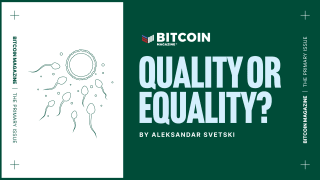
My first experience with Andreas Antonopoulos is at the Toronto Expo. There are no seats left with my friends at their table, and one of them jokingly suggests I go sit with Antonopoulos. Not being one for fear, I approach him and introduce myself. He stands, smiles, shakes my hand and says he "knows me from Twitter." I smile and ask, “is there anyone you’d recommend I sit with in the room; someone good in the industry?", hoping for an introduction to some Antonopoulos-approved players. “There’s room at my table. Sit with me.” This is my first experience with Antonopoulos in person, and he does not disappoint. Over dinner, he agrees to give me an hour of his time the next morning to interview him and ask all my burning Bitcoin questions. I wind up getting over an hour. Part I of this exclusive interview is about his beginnings as a young man, living in Greece, his decision to study distributed systems and his entry into Bitcoin. Part two will explore his thoughts on the regulation issue, and how to best establish companies. Part three will explore how we can actually change the world for the other 6 billion.
Part I: Ancient History
Antonopoulos is half-Greek and half-British. Raised in the remnants of Greece’s fascist dictatorship, Antonopoulos has specific values, ideas and themes woven into him from a very young age that influenced his entry into cryptocurrencies and Bitcoin. Take Antonopoulos’ heritage back to ancient Greece, where thought leaders discuss the idea of tyranny corrupting and how centralized institutions bring tyranny. Antonopoulos learns at a young age that the best way to prevent corruption is to broaden access to power. This Greek heritage, combined with Antonopoulos’ upbringing in the remnants of a fascist dictatorship that cracks down on dissent, free speech and freedom of association, shapes him for his formidable years. When Antonopoulos was introduced to his first computer, at age 10, he was "completely enthralled" with the technology. The Internet offered Antonopoulos a way to "connect with people smarter with him, people who had similar interests as him, and people he could learn from". This accessibility opened up a whole new world for him. His favorite topics? Computers… and free speech. The ability for him to speak his mind and not face reprimanding from his government was freeing. His newfound network – the Internet – offered him a community where he could speak freely with like-minded individuals. This community was both distributed and decentralized, seeing users connect and participate from all over the world.
Internet Influence
At age 14, Antonopoulos acquired his first modem and quickly began creating online communities. His love for communities exists even to this day, as he speaks about the community behind Bitcoin often. As a young man, Antonopoulos even developed a service provider for the Internet – before the Internet was even ‘a thing.’ Imagine, Antonopoulos on the Internet in 1989, as a teenager. He was so excited about this emerging technology that he introduced the first computer club to his school. His enthusiasm and passion for distributed systems only grew, leading him to London, England for a Bachelors Degree in Computer Science, and then into a Masters Degree in Data Communications Network and Distributed Systems. His tutor was a board member of the IETF, the Internet Engineering Task Force. During this time, Antonopoulos got involved with some of the people who were leading the development of standards around IPV6, and "worked on the backbone of the Internet." Antonopoulos’ conditioning stayed with him throughout his young adult years. He remained committed to the ability for all people to speak freely and exchange information freely. For him, cryptography and anonymity lead to freedom of association and political empowerment – something he was unable to experience growing up – and, thus, a very powerful concept for him. He entered the cyberpunk/cypherpunk movement as a result of this belief. This was the start of Antonopoulos’ long and continuing career in distributed systems, that would eventually lead him to advocating for Bitcoin. His history has perfectly conditioned him as an advocate for this decentralized, distributed, world-changing technology.
The Movement that Led to Cryptocurrencies
The idea of freedom of expression is still a radical idea while Antonopoulos attends school in London, England. In fact, the US is still strongly resisting this notion during this time, and in the early 1990’s, Crypto Wars erupt between the American Government and the Internet. Antonopoulos recalls the Clinton Administration being adamant on monitoring all information flow on the Internet, and the Internet community battling hard to ensure people could have access to strong cryptography. Simultaneous to the Cypher/Cyberpunk movement was the growing Digital Currency movement. Antonopoulos watched David Chaum deliver speeches in Amsterdam and London about his zero-knowledge proofs and blind signature inventions, which would eventually lead to the creation of DigiCash. Fascinated, Antonopoulos involved himself more and more in cryptography as a result of Chaum’s work. Eventually, his interests would lead him into the security side of Internet systems. Antonopoulos built a couple of companies that did security-based services for financial companies in London, based around open-sourced technology and Linux. He built firewalls, gateways and things like that, and watched his companies grow. His career was dedicated to security on the Internet. It wasn’t until 2011 that Antonopoulos would revisit the concept of digital currency.
Discovering Bitcoin: Nerd Money to Next Big Thing
Antonopoulos discovered Bitcoin twice. The first time he heard of it, he dismissed it as ‘nerd money,’ which, much to his consolation, is a common reaction, even by people who are very much into digital currencies, including Wade Dye, Nick Szabo and Adam Back. At first glance, he did not see it as a system that would work, relating it to Wikipedia – something that would work in theory, but not in practice. The idea that Bitcoin would succeed because of competition for proof-of-work seems like it would descend into chaos and be easily corrupted – just like the idea of everyone editing a large encyclopedia. But both ideas succeed, because the system creates robust self-organization. The second time Antonopoulos heard about Bitcoin was when he took the time to read Satoshi’s whitepaper. It ‘blew his mind’. For the first time, Antonopoulos realized the potential of Bitcoin as not just a currency, but also a trust network. Once he realized that, it triggered all of his associations with distributed systems, distributed security and trust models. Larger than this, however, Antonopoulos saw the social and economic implications of Bitcoin – its ability to decentralize systems and avoid corruption in a very effective way. Suddenly, it seems as though everything had primed Antonopoulos for this exact moment: his Greek heritage, his upbringing in the remnants of a limiting fascist dictatorship, his fascination and knowledge of the Internet, and his passion for freedom of speech, association and flow of information. He has always believed that decentralized systems are more effective at achieving goals of scale without being as easily corrupted as centralized organizations. Bitcoin presented Antonopoulos with an incredible opportunity: to take his knowledge to the spheres of public education, advocacy and speaking, where he felt he would make the biggest impact. Alongside these initiatives, Antonopoulos remains interested and engaged in security in the space. He advises Bitcoin companies on this topic and currently works in this capacity with Blockchain.info. Both Bitcoin the trust network and Bitcoin the currency decentralize power more effectively than many other systems Antonopoulos has seen thus far. His already fragile trust of authority and institutions would only amplify come 2008, as he watched his customer base in terms of security consulting shrink and become limited to intelligence agencies, defence companies, governments and banks, or "murderers, torturers and thieves." Antonopoulos’ work became more and more challenging as his principles were misaligned with his actions. He gradually withdrew from the sector he had built for himself. Now, he is driven every single day with his work in Bitcoin, as it allows him to work in such a way that his skills and perfectly aligned wit his principles. He ‘may be broke, but [he ’s] happier than he’s ever been.’ Stay tuned for Part II: Regulations and Exchanges










